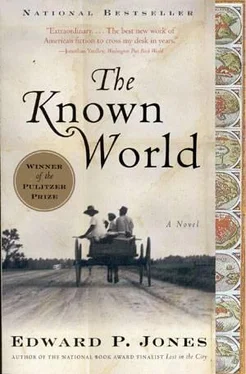Ellwood continued to wiggle and when his mother put him down, he soon began to pull on her frock, wanting her to pick him up again. “See, see,” she said. “See, you don’t always want what you think you want. See. Why don’t you listen to me sometime?” The baby looked up, pleading: I done learned my lesson. Pick me up again. His mother tapped the foot of her good leg. No, the foot said. No lesson could stick in the head if it was only a few seconds long. She tapped on. The bloodhound beside them was gnawing on a bone that he would keep even when a child came along later and offered something bigger and better. Ellwood extended both hands up to Celeste and she relented. Once up again, Ellwood put his arms around her neck. “Mr. Blueberry,” Ellwood Freemen would say more than twenty years later to Stamford Crow Blueberry in Richmond, “I have come to fulfill my duty, just as I gave you my word that I would. I have come to teach for you and the chaps.” Ellwood the baby, back in his mother’s arms, looked around and sighed. His mother kissed his neck and said, “Maybe next time you’ll listen to me.” In 1993 the University of Virginia Press would publish a 415-page book by a white woman, Marcia H. Shia, documenting that every ninety-seventh person in the Commonwealth of Virginia was kin, by blood or by marriage, to the line that started with Celeste and Elias Freemen.
Stamford now came from behind Celeste and tickled her shoulder. The baby Ellwood and Celeste and Stamford looked at the gathering of people just beyond them in the lane. People came out of their cabins to Caldonia not so much because she was the mistress but because she had not long ago suffered a death. They all knew death, even the very young who had yet to lose someone. Ellwood the baby saw Stamford and reached for him. Only weeks ago the man and the baby did not even know the other existed, but then Stamford had seen the cabin in the sky. Ellwood grabbed for him, needing him, and Stamford took him in his arms. The baby studied Stamford and as his hands reached for the man’s face, Stamford teased and pulled it back, his mouth beginning to open to say the words the baby wanted. Stamford was still a year away from first kissing Delphie.
“Lord, I wish we could get some better days,” Celeste said to Stamford. “I’m tired a this mess of a weather. I really am. I wish the Lord would reach down in that big bag a days of his and pull us out some good-weather days that would last and last. Some nice and plump days layin over there in the corner right next to day fore yesterday. God could give us some nice days, Stamford, if he had a mind to. He could even lend em to us. By now he should know we a people that take care a things and we’d hand em back just the way he give em to us.”
Celeste was practically talking to herself now because Stamford and the baby were in a world of their own. The baby’s hands had reached the man’s face and he was tapping every feature of it, doing everything that was necessary for the man to say the words the baby had come to expect in their brief history together. Stamford’s mouth opened more and more. “You here early this mornin,” Stamford Crow Blueberry would say to Ellwood Freemen that day some twenty years later in Richmond. Ellwood would be walking up the street with the reins of his horse in his hand, and Stamford would be walking with a baby resting on his shoulder, the newest member of the Richmond Home for Colored Orphans. Mother and father killed in a fire. Walking and singing to the baby in the morning seemed to calm the infant for the rest of the day. Ellwood Freemen would say, “I have come to fulfill my duty, just as I promised, Mr. Blueberry. Is that to be one of my pupils?” Stamford would shake his hand, nodding. Ellwood said, “You look as if you didn’t believe I would keep my word.” “Oh,” Stamford said, “I whatn’t worried. I know where your mama and papa live. I know where I could find them to tell em that their boy didn’t keep his word.” Ellwood told him he had to tend to some business elsewhere in Richmond and would return shortly to settle in at the home for orphans. He got on his horse and rode slowly out to the main street, the street that would be named for Stamford Blueberry and his wife Delphie. Blueberry, with the new orphan on his shoulder, followed. He watched Ellwood take his time going off and Stamford that day would realize for the first time just how far they had come. He would have cried as he had that day after the ground opened up and took the dead crows, but he had in his arms a baby new to being an orphan. Stamford, it don’t matter now, he told himself, watching Ellwood and the horse saunter away. It don’t matter now. The day and the sun all about him told that was true. It mattered not how long he had wandered in the wilderness, how long they had kept him in chains, how long he had helped them and kept himself in his own chains; none of that mattered now. He patted the baby’s back, turned around and went back to the Richmond Home for Colored Orphans. No, it did not matter. It mattered only that those kind of chains were gone and that he had crawled out into the clearing and was able to stand up on his hind legs and look around and appreciate the difference between then and now, even on the awful Richmond days when the now came dressed as the then. Behind him, as he walked back, was the very corner where more than a hundred years later they would put that first street sign-STAMFORD AND DELPHIE CROW BLUEBERRY STREET.
The baby Ellwood had now finished the ritual of touching every feature of Stamford’s face. Celeste said, “Maybe a lotta days is too much to wish for. Maybe just two or three in a row.” The baby Ellwood now waited and the reward came and Stamford opened his mouth and sang the way he would just before Ellwood came up the street that Richmond day with his horse trailing behind-
Mama’s little biddy baby gon git it all real sweet
Mama’s little biddy gon git it all nice and sweet…
The glee spread throughout the baby’s body. He began clapping his hands, not as any sort of applause but because there was so much happiness in his body that this was the only way he could release some of it.
Celeste looked down the lane, where there was now a larger crowd, her husband and two children among them. The little twins named Henry and Caldonia came tottering out of their cabin and Loretta lowered the lantern just a bit so that all might get a better look at the children. As she brought the lantern down, the shadows of the twins that had been resting on the ground behind them grew and grew so that by the time everyone had a good look at the babies, the shadows were as tall as the children.
Celeste learned the next day, Friday, that Caldonia, with a recommendation from Louis, had made Elias overseer. The two men would become close over the next days.
That Friday, too, Ray Topps, the man from Atlas Life, Casualty and Assurance Company returned and had no trouble getting in to see Caldonia. He came with Maude. A widower with nine children, including three unable to walk and one unable to see or hear, a man who had failed at his patent medicine business, Topps had many papers, which he was anxious to show Caldonia. All the papers had the name of the company spelled “Aetlas.” “Unfortunately,” he explained, sitting next to her on the settee, “there seems to have been an abundance of E ’s at this particular printer’s. But I assure you we have always been known as Atlas and we always will be. Your children will know us as that, and so will your grandchildren. Their children will know the same.” For the moment, with all the talk of children, he forgot he was talking to a childless widow. “You get the meaning I’m trying to convey to you, Mrs. Townsend,” he said, seeing his mistake. And Caldonia said that she did.
Читать дальше












